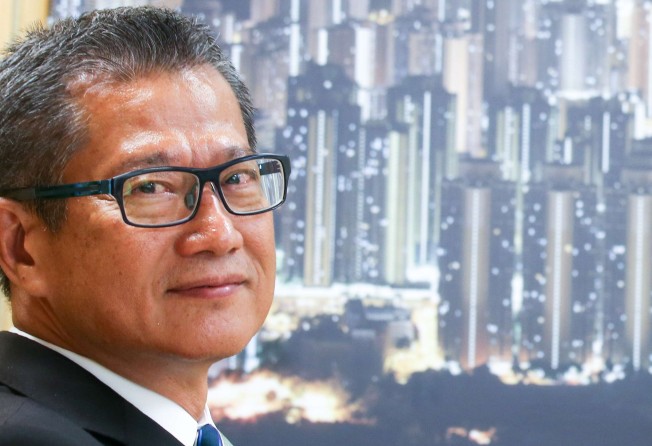Hong Kong finance chief’s main points at a glance
Paul Chan surprises with a tax review and defence of predecessor John Tsang, but will he be around to give a second budget speech next year?

A long-term look at the tax regime
Perhaps one of the biggest surprises in Paul Chan Mo-po’s maiden budget speech was his plan to set up a tax policy unit to review the revenue base.
The unit, to be placed within the Financial Services and the Treasury Bureau, may look at ways to create new taxes on top of the current major sources – profits and salaries taxes, stamp duty and land sale revenue.
The idea has been floated by public finance analysts for years due to Hong Kong’s ageing population, which will result in a reduced workforce and higher public spending on welfare and medical services.
“As a responsible government, we have to cope with the huge expenditure needs under different economic scenarios. We cannot propose a tax cut which erodes our revenue base.
“Neither can we adjust our tax rates frequently, as this would affect the predictability of our tax regime and dent investor confidence,” Chan said.
“We have to examine the international competitiveness of our tax regime and address the problem of a narrow tax base.”
He said the new unit would “comprehensively examine these tax issues from a macro perspective”.
Higher-than-expected surplus to be put to good use
The surplus, forecast to reach HK$92.8 billion, is eight times higher than the HK$11.4 billion figure that John Tsang Chun-wah expected early last year. The increase is mainly due to a high level of revenue from land sales and stamp duty.
“Given the higher-than-expected surplus for this financial year, I will take a forward-looking approach to put HK$61 billion of the surplus to good use,” Chan announced.
That includes HK$30 billion to strengthen elderly services and rehabilitation services for those with disabilities and HK$20 billion for sports development.
A total of HK$10 billion has been reserved to support innovation and technology development, while HK$1 billion will be set aside for youth development.
Education expenditure to grow substantially
With education being a constant theme in the chief executive race, Chan highlighted the government’s continued commitment to the sector.
The government’s financial commitment to pre-primary education will increase by about HK$2.7 billion annually with free kindergarten schooling being introduced in the coming financial year.
Chan said he would regularise the study subsidy scheme for designated professions or sectors from the 2018-19 academic year, increasing the number of places from about 1,000 per cohort to 3,000. About 13,000 students were expected to benefit from the scheme each academic year, involving an expenditure of about HK$850 million per year, Chan said.
Chan also proposed injecting HK$1.5 billion into the Continuing Education Fund in 2017-18, as well as raising the tax deduction ceiling for self-education expenses from HK$80,000 to HK$100,000.
Paul Chan’s defence of John Tsang
John Tsang Chun-wah, who quit as financial secretary in December to run for Hong Kong’s top job, has often been criticised for being “miserly” on social spending.
In his speech, Chan, who was development secretary before replacing Tsang, came to his predecessor’s defence.
“It has also been suggested that the fiscal reserves of over HK$900 billion are just too much, and instead of being miserly, the government should consider major tax cuts and step up efforts to relieve people’s hardship,” Chan said.
“While I share the view that the government, with its existing fiscal strength, can afford to be more proactive, we should avoid reckless commitments,” he said.
Will Chan’s direction last?
The budget is the last one for Leung Chun-ying’s administration. Chan, who is widely regarded as one of Leung’s favourite cabinet members, used language that resembled what Leung has said.
At one point, Chan said: “The government must make good use of financial resources, with a view to building a fair and just society where people from all walks of life can share the fruits of economic advancement.”
As if to help cement Leung’s legacy, he went on: “Poverty alleviation, care for the elderly and support for the disadvantaged are at the top of the current-term government’s agenda. We have devoted substantial resources to improve the livelihood of the grass roots over the past four years or so.”
Whether the next chief executive will adopt this thinking is uncertain, as nearly all contenders have distanced themselves from Leung. It is also not sure whether Chan will deliver a second budget speech next year under a new chief executive.